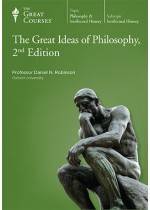

The Great Ideas of Philosophy (Great Courses, #4200)
by Daniel N. Robinson
Taught by Professor Daniel N. Robinson, Ph.D., Oxford UniversityThe Great CoursesPhilosophy & Intellectual HistoryThe Teaching CompanyLecture Series60 lectures, 30 minutes/lecture Taught by Daniel N. Robinson Philosophy Faculty, Oxford University; Distinguished Professor, Emeritus, Georgetown University Ph.D., City University of New York Humanity left childhood and entered the troubled but productive world when it started to criticize its own certainties and weigh the worthiness of its most secure beliefs. Thus began that "Long Debate" on the nature of truth, the scale of real values, the life one should aspire to live, the character of justice, the sources of law, the terms of civic and political life-the good, the better, the best. The debate continues, and one remains aloof to it at a very heavy price, for "the unexamined life is not worth living." This course of 60 lectures gives the student a sure guide and interpreter as the major themes within the Long Debate are presented and considered. The persistent themes are understood as problems: * The problem of knowledge, arising from concerns as to how or whether we come to know anything, and are justified in our belief that this knowledge is valid and sound * The problem of conduct, arising from the recognition that our actions, too, require some sort of justification in light of our moral and ethical sensibilities-or lack of them * The problem of governance, which includes an understanding of sources of law and its binding nature. The great speculators of history have exhausted themselves on these problems and have bequeathed to us a storehouse of insights, some so utterly persuasive as to have shaped thought itself. In these coherent and beautifully articulated lectures you will hear Plato and Aristotle, the Stoics and Epicureans, the Scholastic philosophers and the leaders of Renaissance thought. In addition, you will learn about the architects of the Age of Newton and the Enlightenment that followed in its wake-all this, as well as Romanticism and Continental thought, Nietzsche and Darwin, Freud and William James. This course is a veritable banquet of enriching reflection on mental life and the acts of humanity that proceed from it: the plans and purposes, the values and beliefs, the possibilities and vulnerabilities.
Release Date:
January 27, 2004

